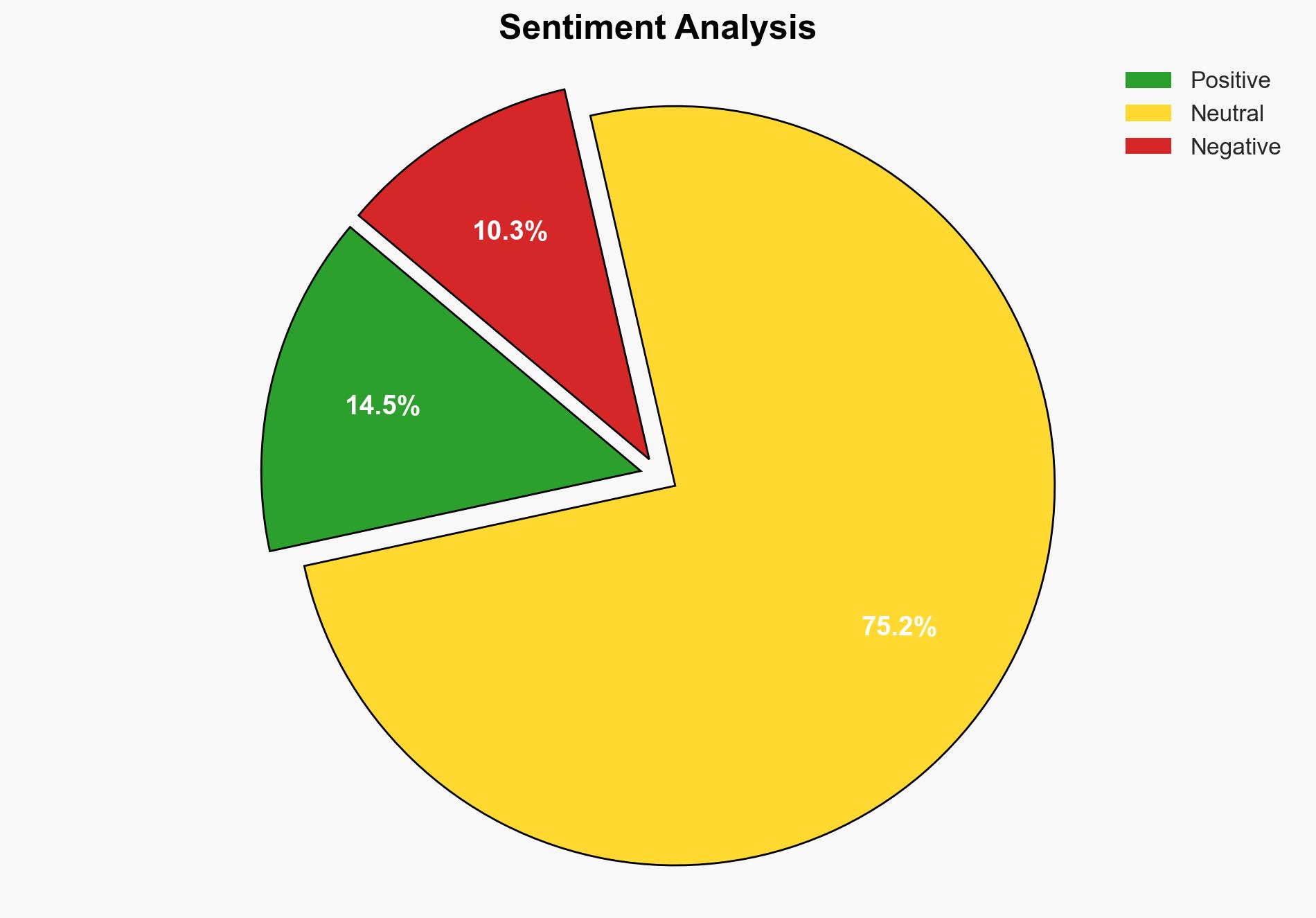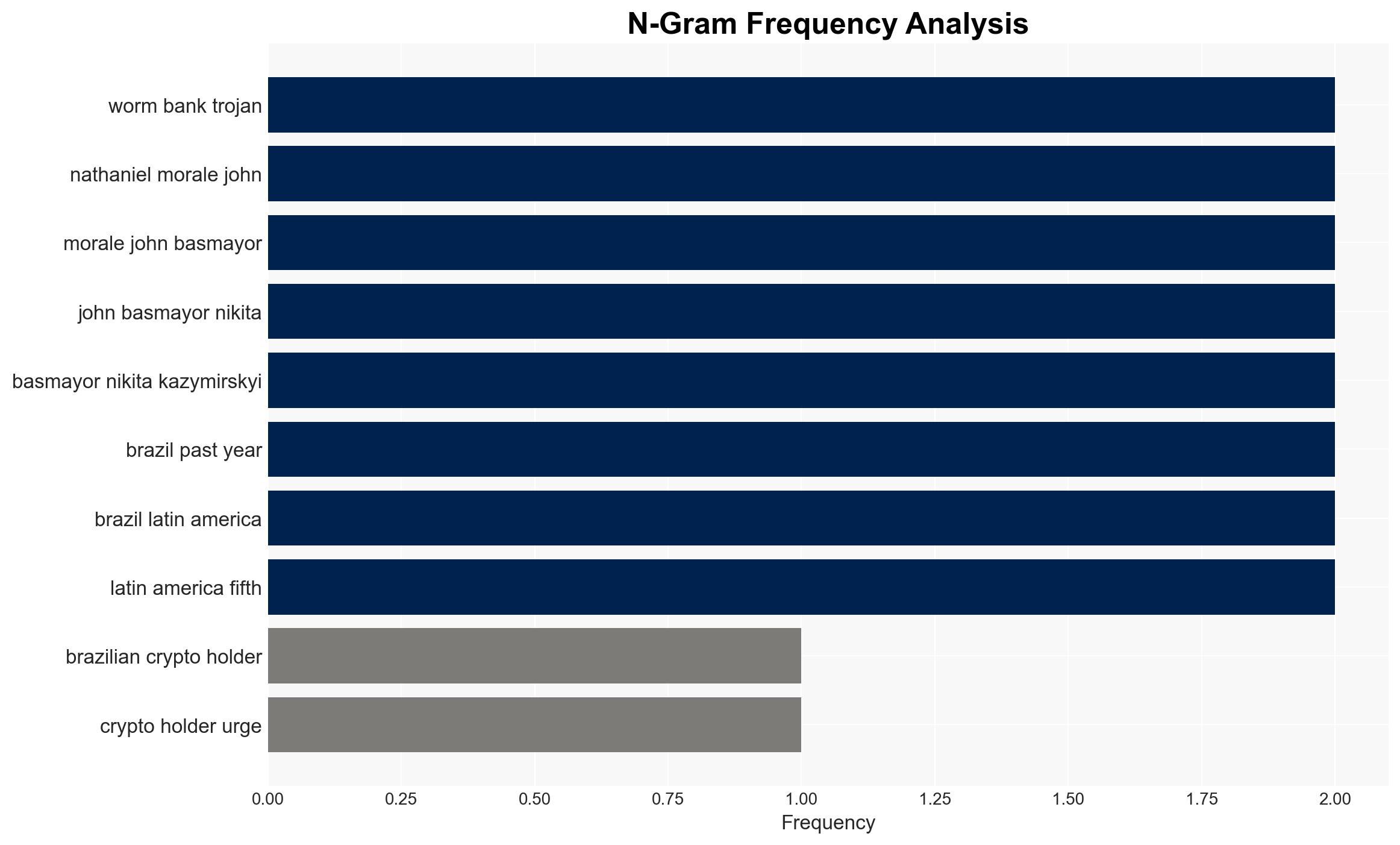Warning WhatsApp worm targets Brazilian crypto wallets bank accounts – Cointelegraph
Published on: 2025-11-20
AI-powered OSINT brief from verified open sources. Automated NLP signal extraction with human verification. See our Methodology and Why WorldWideWatchers.
Intelligence Report: Warning WhatsApp Worm Targets Brazilian Crypto Wallets and Bank Accounts
1. BLUF (Bottom Line Up Front)
The most supported hypothesis is that a sophisticated cybercrime operation is exploiting WhatsApp’s popularity in Brazil to target crypto wallets and bank accounts using the Eternidade Stealer malware. This operation poses a significant threat to financial security in Brazil, with a high confidence level due to the detailed technical analysis provided by Trustwave SpiderLabs. Immediate action is recommended to enhance cybersecurity measures and public awareness campaigns.
2. Competing Hypotheses
Hypothesis 1: A coordinated cybercrime group is leveraging WhatsApp to deploy the Eternidade Stealer malware, specifically targeting Brazilian crypto users to steal financial data and assets.
Hypothesis 2: The malware campaign is a broader, less targeted attack aiming to exploit any vulnerable WhatsApp user globally, with Brazil being a significant but not exclusive target due to high crypto adoption.
Hypothesis 1 is more likely due to the specific targeting of Brazilian financial institutions and the use of Portuguese-language social engineering tactics, as reported by SpiderLabs.
3. Key Assumptions and Red Flags
Assumptions: The analysis assumes the accuracy of the technical details provided by SpiderLabs and the effectiveness of the malware’s evasion techniques.
Red Flags: The potential for misinformation or exaggeration in the report to promote cybersecurity services. The complexity of the malware might be overstated to increase perceived threat levels.
Deception Indicators: The use of fake government programs and fraudulent investment groups as lures suggests a high level of sophistication and intent to deceive.
4. Implications and Strategic Risks
The campaign could lead to significant financial losses for individuals and institutions, undermining trust in digital financial services. Politically, this could pressure the Brazilian government to enhance cybersecurity regulations. Economically, it might deter crypto adoption and investment in the region. The informational risk includes potential misinformation campaigns exploiting the situation to sow distrust in digital platforms.
5. Recommendations and Outlook
- Enhance public awareness campaigns about phishing and malware threats on WhatsApp.
- Strengthen cybersecurity infrastructure, particularly for financial institutions and crypto exchanges.
- Encourage collaboration between government, tech companies, and cybersecurity firms to develop rapid response protocols.
- Best-case scenario: Swift action mitigates the threat, and public awareness reduces the impact of future campaigns.
- Worst-case scenario: The malware evolves, bypassing current defenses, leading to widespread financial disruption.
- Most-likely scenario: Continued sporadic attacks with incremental improvements in defense mechanisms and public awareness.
6. Key Individuals and Entities
Nathaniel Morales, John Basmayor, Nikita Kazymirskyi (Trustwave SpiderLabs researchers)
7. Thematic Tags
Cybersecurity, Brazil, Cryptocurrency, Malware, Social Engineering, Financial Security
Structured Analytic Techniques Applied
- Adversarial Threat Simulation: Model and simulate actions of cyber adversaries to anticipate vulnerabilities and improve resilience.
- Indicators Development: Detect and monitor behavioral or technical anomalies across systems for early threat detection.
- Bayesian Scenario Modeling: Quantify uncertainty and predict cyberattack pathways using probabilistic inference.
- Network Influence Mapping: Map influence relationships to assess actor impact.
Explore more:
Cybersecurity Briefs ·
Daily Summary ·
Support us





